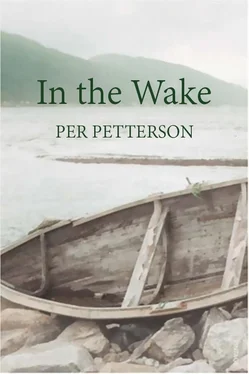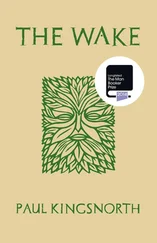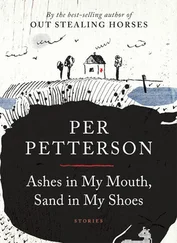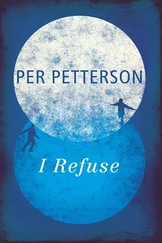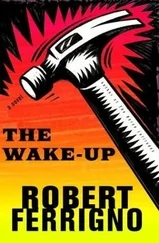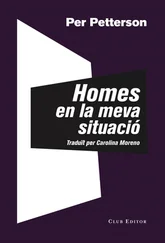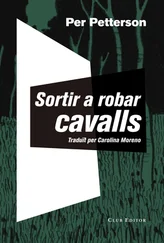“You lost,” I say, “two-nil at home,” and laugh again, but it does not sound too good, so I stop at once and go into the bathroom to take the shower I sorely need, and I lock the door when I leave.
*
The caretaker looks at my clothes, he is pissed off because everyone loses their keys, because he has to go out and walk several hundred metres to each block with the master key, and he is forever writing orders for new ones. He has other things to do, he says. If that is so, it has escaped me; there are light bulbs missing in most of the basement corridors, in one stairwell a pane of glass has been broken since New Year’s Eve, and the mechanism of the garage door has disintegrated, and the door has been left open for two weeks. He twists the key in my lock and flings the door wide with a condescending air, and glances inside. He knows about the likes of me, he has seen pictures of me in the papers and knows what I’m up to, and he thinks it is crap. Then he gives me the slip of paper with the key number on and permission to have a new one cut.
“It will cost you,” he says, “it always does when you chuck things around. Don’t let it happen again. OK?”
But he doesn’t hold out much hope, that’s obvious, and then he goes off, on his way to his long list of chores. It is a tough life, being a caretaker.
I go in and slam the door behind me. I stand still for a moment. Then I turn and look at myself in the mirror. The swelling under my eye has quite gone and the colour is normal. My hair is still damp and has started to curl. The pale, frozen man I saw last night has vanished, you would think I lived a normal life, that I was on my way out to the bus for work after a shower. But I am not on my way to anything my father would have called a job.
The keys are on the shelf below the mirror. I cannot remember putting them there. I’ve never put them there before. I pick them up and stuff them in my right trouser pocket where they belong, and in the kitchen I throw the permit into the bin. Suddenly I feel so hungry it hurts. I open the fridge. There is not much left inside, and what there is I put in a paper towel and chuck out, and pour the dregs of the milk into the sink. Then I fetch a bucket, squirt detergent in and fill it with hot water, find a clean cloth in the hall cupboard, and then I wash the fridge and thoroughly dry it. After that I attack the dishes which have cluttered the worktop for ages, almost tap-dancing with impatience because I am so hungry. I wash the worktop and the kitchen table and polish the brass bowl, and I wash all the cupboard doors and the wall behind the sink and the top and the sides of the stove where I can reach, and then I stand back and study it all, and finally, not quite satisfied, I fill another bucket and wash the floor.
I change my trousers in the bedroom. I make the bed and take my dirty clothes out to be washed, then vacuum the carpet and sort the heap of books into two piles on the bedside table with Tranströmer’s Baltics on top. “It was before the time of radio masts./ Grandfather had just become a pilot.”
I must have read it ten times. It makes me think of my own grandfather who was a joiner, not a pilot, but who went down to the harbour every single day for most of his life and along the quay to look out on the sea and the changing weather towards the lighthouse far out where everything ended. He did not keep a log-book, but took careful note of ships arriving and ships departing, and at regular intervals I was on board one of them. He is dead now and has been for ten years, but I miss his silence and his dry windblown eyes and the town where he lived with him in it and the bottle of Aalborg aquavit he brought across the sea every Christmas. Lifeline schnapps, we called it.
While I’ve been doing all this I have had my pea jacket on. Now I take it off and go out on the balcony in the cold with a brush and a little cold coffee in a cup, and I brush away at the dried stains from last night, splash a little coffee on them and brush some more. It’s a trick I learned from my mother, and the jacket comes perfectly clean. Not once do I look over at the window in the next block.
I switch all the lights off when I leave, feel the keys in my pocket and take the stairs two floors down to the garage under the block. For I do have a car, even though I forget sometimes. It is a thirteen-year-old white Mazda 929, a station wagon, and the first thing one of my neighbours said when I parked it in front of the block, was “Have you bought yourself an immigrant’s car?”
In fact, I did buy it from a Pakistani in Tveita for 15,000 kroner, but I did not know that what I did was not quite kosher. I don’t keep up with car fashions. The Mazda is really good enough, a bit rusty here and there, but it has a strong motor and holds the road well, and is as soft to drive as an American car. I haven’t used it for a fortnight, so I walk round it to check whether there is a flat tyre, but everything seems fine except that someone has written “Wash me” in the dust on the bonnet. I get in and it starts at the first try as it always does, and I can drive straight out as the garage door has more or less fallen apart and stays open the whole time.
I do what the writing tells me. I drive to the Texaco station on the main road and pay fifty-five kroner for a wash with wax, buy a newspaper, then drive into position and sit in the car reading the arts section by the overhead light. That is soon done even with cheap glasses at this time of year, and the sports pages are boring now at the end of the skiing season before the football gets going. Now everyone is just waiting, and the water splashes the windows and shuts out the view, and the brushes rumble and sweep over the car, and they’re green and blue and make me want to sleep, and if I wanted to sleep I could do that in a den like this, where I cannot be expected to do anything but wait.
But then the water stops, the brushes pull back and stop rotating, and hang there like the dead animals hunted for their fur that I’ve seen in Helge Ingstad’s books. The door in front of me bangs open, a panel lights up over the door saying “Drive out” and I put the car into gear and it starts without problems. It is unpleasantly light outside, and I am so hungry now that my body feels numb. I had really intended to drive to a shop just a bit further away than my own Co-op to avoid the neighbours, but I cannot find one I like the look of, just drive past one place after another until I am nearly in Lillestrøm. Then I take the right turn towards Enebakk immediately before the big bridge, up the long hill through Fjerdingby, and there are several shops along the road, but I do not stop, and then there is nothing but farms and fields and forest. The road runs beside the big lake in wide curves, and sometimes you see it and sometimes you don’t. Everything is in black and white like in films from the forties, the spruces are black, the snow is white and the ice still covers the lake right across to the other side where there is forest as well, and farms and grey-white fields and then forest again as far as the eye can see. This is what I like, just driving here, and it starts to snow, a few small specks at first, and then suddenly huge flakes that stick to the windscreen, and I turn the wipers on. One makes a scraping sound each time it moves to the left, but that does not matter. I turn them up to full speed and push my hand under my jacket and shirt and in to my bare chest and feel them beat in time with my heart. The snow whips against the glass and then it is swept away, hits the glass and is swept away, I drum on the gear lever and hum a tune, the whole car thumps in the same rhythm, and so does everything outside, and I feel so light, light, and I do not think of my brother or Mrs Grinde at all.
Читать дальше
